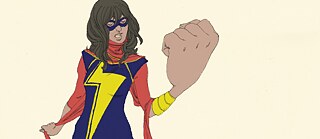Comic
Generational Reflections in Ms. Marvel

Comics, like all popular culture, reflect the generation of those who create them and those who consume them. Generational sentiments about gendered, racial, and socio-cultural identity transcend the page and inform the comics’ universe. Just as those constructions shift and change in the real-world so too do, they exhibit profound flexibility in the comic universes. Occasionally comic narratives actively acknowledge these impacts, not ignoring the nature of human existence and its ever-changing reality by exploring and evaluating it from within
By Maryanne Rhett
The 2014 resurrection of the Ms. Marvel title offers a self-conscious example of how generational trends both shape a comic’s construction and simultaneously reflect on the impact generations have in the creation of the contemporary world. The main thrust of Ms. Marvel’s narrative remains at its heart a story of good v. evil, Kamala Khan, the titular character when not wearing a mask, is the personification of an increasingly globalized world, and at the same time consciously the product of generational change and movement. A teenager living in Jersey City, New Jersey and of Subcontinent extraction, like any superhero Khan’s backstory is crucial to understanding what motivates her. Unlike most other superheroes, however, Khan’s backstory does not center solely on her parents and her childhood, but traces a narrative back to her great-grandparents, half a world away. To place Khan in her twenty-first century life, among her twenty-first century friends, problems, and choices, Ms. Marvel’s creators tell her story through that of an early and mid-twentieth century world. Racked by imperial devolution, strident ethno-nationalist division, and emergent women’s movements, this world sets a backdrop for the contemporary Khan’s struggles and self-discovery.
The 2016 subseries, “Civil War II” (Nos. 8-10), traces the story of four generations of women in Kamala Khan’s family -- her great-grandmother (Aisha), grandmother, and mother (Muneeba) -- from India through Pakistan and ultimately to the United States. Embedded in this narrative are subtle clues about the nature of Islam as understood by these women and their families, and the power of women in shaping their own destinies. This subseries begins in 1947 Bombay with a pregnant Aisha attempting to leave India, and cross into Pakistan. Khan’s great great-grandfather objects, declaring, “But we’re Indians,” to which her paternal grandfather responds: “not anymore.” As the three set out on the journey the audience is told that the “wedding bangles” Aisha wears hold the money she gathered by selling off her jewelry, to be used in their new life. In this narrative of national dislocation, we hear that “Even in the midst of civil war, life can begin again.” In this brief look at Khan’s backstory, we are taught how generations who came before help establish the things, we ourselves become.
Sometime near 1999 the story picks up again as Khan’s grandmother and Muneeba talk about the impending move to New Jersey. Muneeba does not want to leave Pakistan, she does not want her children to not know “home.” Khan’s grandmother gives Muneeba the wedding bangles, saying “Give them to your own daughter when she is old enough. She will be born on another continent, but her history will be our history.” It is presented quietly, but the narrative of Khan’s maternal ancestry is closely tied to significant global events shaped identity for both the Islamic and non-Islamic world. Indian Partition and Muneeba’s and Yusuf’s journey to the United States is not long before the events of September 11, 2001 link the family’s story to global historical turning points. Partition is a linchpin in Salman Rushdie’s Midnight’s Children, and Rushdie’s other work, Satanic Verses, incurred the wrath of many Muslims and led to Ayatollah Khomeini’s infamous fatwa. For many people outside the Islamic world, and unaware of its nuance and diversity, Partition, the Islamic Revolution in Iran, or the fatwa are moments punctuating and highlighting their understanding of that world. The events of September 11, 2001 have a similar impact on the generations born after 1979.
Inside the narrative of Ms. Marvel there is recognition that generational change and dislocation shapes subsequent generations. Outside of the Marvel Universe, Kamala Khan’s life, ancestry, and experience reflects the contemporary generation as well. First-generation children of immigrants find in Khan’s story their own experiences. Muslims, far too often vilified in popular culture of the West find voices true to their diversity of experiences. Women, who while not left out of the superhero tradition, are nevertheless often overlooked see a narrative that explores their own struggle for empowerment. Today’s comics audiences may largely be between the ages of 13 and 35, but comics like these, that acknowledge a broad sweep of history reflect not only the contemporary generation’s struggles and successes, but expose the foundational elements left by those who came before.